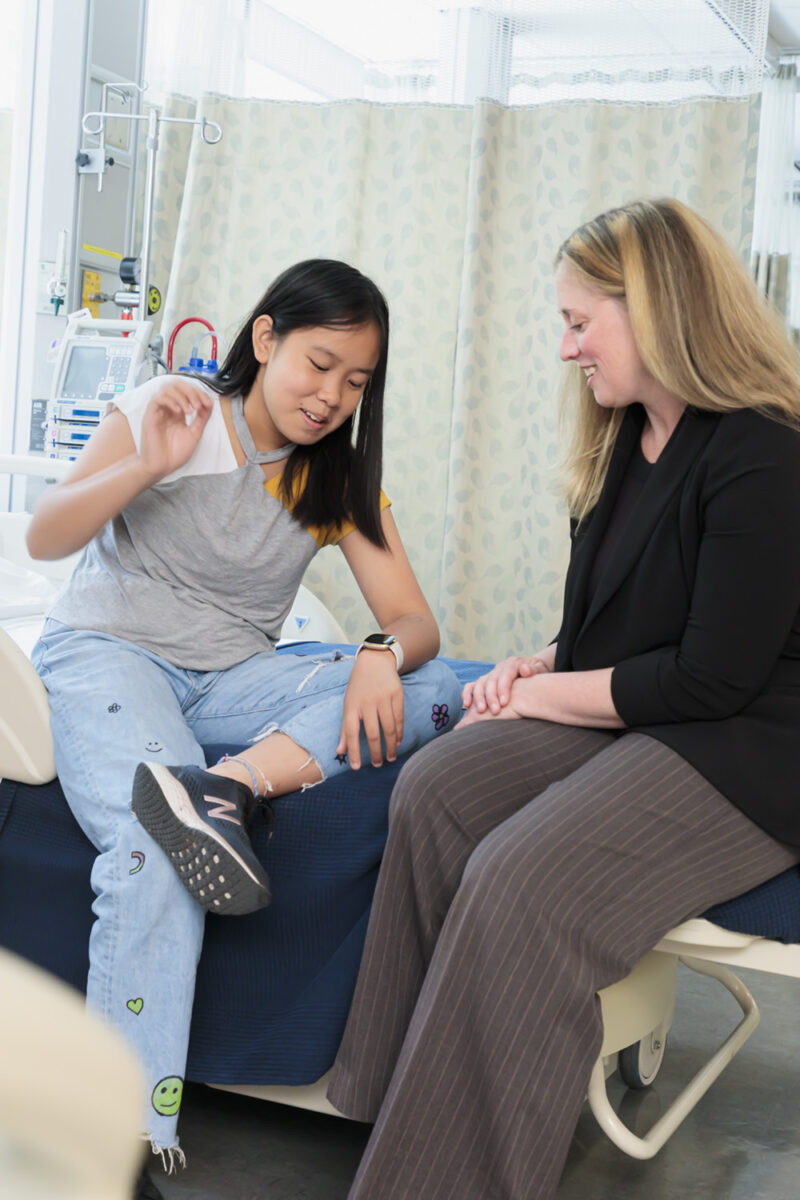Sleep has important connections to our health and well-being, but we often believe we can muddle through without it, ignoring our need for some shut eye. Many of us have likely attempted to keep our babies and young children on a “sleep schedule,” but at some point, usually once they hit adolescence, sleep becomes less of a priority for them too.
“Good sleep affects so many functions in our day to day lives from our ability to learn new things, to our behavioural and emotional regulation, and even our impulse control,” says Jordana McMurray, a PhD student at the Lawrence Bloomberg Faculty of Nursing, who is studying the relationships between sleep and anxiety and depression symptoms in young people with cystic fibrosis (CF).
“Research has shown that sleep and mental health are profoundly connected, and I’m particularly interested in how this connection might impact those with chronic illness at a developmental period known to be a time of risk for both sleep and mental health concerns.”
As part of her thesis research, McMurray, who was a clinical nurse in respiratory medicine at the Hospital for Sick Children (SickKids), is examining whether this developmental period and the risks associated, are heightened for those living with CF. She believes that a more complete understanding of this issue could have a significant impact on well-being and quality of life. There are currently no clinical practice guidelines for assessing sleep in patients with CF, but McMurray is hopeful her research will help to change that.

In recognition of World Sleep Day on March 15th, a global awareness campaign for sleep and its importance in our daily lives, Bloomberg Nursing’s senior communications lead Rebecca Biason, spoke with McMurray about her research and the relationship between sleep and mental health in youth with a chronic illness like CF.
What are some of the impacts of poor sleep on youth?
Poor sleep, especially in young people, can result in something called, sleep debt. Adolescents and young adults go through a phase shift in their sleep schedules as part of their normal development. This means they have a physiologic and circadian predisposition to go to sleep later. However, this creates problems when they encounter work or school responsibilities which mean they can’t sleep in to make up for lost sleep. These consistently shorter sleep durations over many nights, leads to an accumulation of what is known as sleep debt. Most concerningly, shorter sleep duration and greater sleep debt has been strongly associated with altered mood and self-harm in this age group.
Sleep also plays a crucial role in how our bodies function. Poor sleep is associated with a decrease in our immune functioning and our ability to metabolise glucose. For example, poor sleep has been linked to reduced vaccine effectiveness and an increased risk of developing Type 2 diabetes.
How does sleep differ for young people with CF?
Some of my study participants with CF have said that the worst sleep they experience is when they are admitted to hospital. When we think about acute care environments that are geared towards treatment with bright light and noise, and someone checking on you every hour, we can see how this environment can be counterproductive for promoting sleep.
Outside of the hospital setting, sleep can be challenging for those with CF. They may have frequent night-time wakes due to chronic cough or other disease related symptoms. They may also have trouble falling and staying asleep due to the mental health challenges of living with a life limiting illness. People living with CF have identified sleep as a priority support need, which further stresses the importance of research in this area.
What are you hoping to achieve with your research looking at sleep issues in young people with CF?
My doctoral research study aims to investigate whether young people with CF have more sleep difficulties and more mental health concerns than their peers without chronic illness, to determine if there is a relationship between poor sleep and worse mental health in those with CF, and to try to understand the sleep experience from the perspectives of those who have CF.
Read more about McMurray’s research
I am currently in the data analysis phase, but I hope the results of my research will help to stress the importance of sleep and good mental health in maintaining day-to-day well-being in young people with CF. Sometimes, in the face of a medically complex chronic illness things like sleep and mental health can be de-prioritized or even overlooked. Sleep has historically been far down on the list of priorities for those with CF, especially when compared to other issues like lung function and weight gain. But with recent advances and new life-changing drug therapies like Trikafta, many of the more challenging symptoms are well managed, and there is an opportunity to prioritize sleep.
Are there methods or strategies you can share that help improve sleep?
Prioritizing sleep and staying committed to prioritizing sleep is key. I wish there was a national campaign, to drive that home, in the same way we think about the importance of sleep for babies and young children, sleep is so important for all of us. We exist in this productivity driven world, and sleep is often sacrificed. Even when we consider healthy behaviours we most often think of exercise and eating well, both are definitely important, but sleep is often the last thing we think about in terms of our health and well-being.
Good sleep hygiene is something that everyone would benefit from, but especially for young people. This includes a cool, dark room for sleeping, avoiding screens right before bed, and getting some light exercise everyday. What you consume also plays a role in your sleep cycle, so avoiding caffeine or a big meal before bed, and getting bright light exposure in the morning all play a part in helping you sleep better. Newer research is also suggesting that having consistency in our wake and bedtimes across the entire week can be beneficial. So instead of “catching up” on sleep on the weekends, prioritize sleep across the entire week so that you don’t have the need to “catch up” on the weekend.
